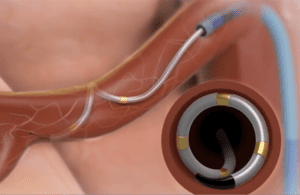
Medtronic
(NYSE: MDT)
issued a statement highlighting its excitement over new renal denervation guidelines in Europe.
The European Hypertension Society (ESH) issued updated guidelines on the role of renal denervation in the hypertension care pathway. It announced the guidelines at the ESH 32nd Annual Meeting and simultaneously published them in the Journal of Hypertension.
Medtronic said in a news release that the guidelines mark a turning point for renal denervation as a hypertension treatment. They support its use as a safe and effective complementary treatment option in reducing blood pressure for patients in addition to medications and lifestyle changes.
In September 2022, Medtronic announced study data demonstrating significant blood pressure reduction with its Symplicity renal denervation system. The SYMPLICITY HTN-3 clinical trial observed subjects who underwent radiofrequency renal denervation (RF RDN) with first-generation Symplicity. Results demonstrated a statistically significant reduction in office and ambulatory blood pressure compared to a sham control group.
Analysts have remained bullish on Medtronic’s renal denervation treatment despite the continuation of its pivotal Spyral HTN-ON MED trial. That trial had to roll into 2022 after failing to obtain the positive results needed to end enrollment early.
How the new guidelines benefiting Medtronic came through
The company said in a news release that the new guidelines follow a series of favorable position papers and consensus statements from ESH. Other key societies shared the same sentiment, Medtronic noted, including the European Society of Cardiology (ESC) and European Association of Percutaneous Cardiovascular Interventions (EAPCI).
Medtronic noted that the new guidelines were “made possible” by the clinical evidence generated around its Symplicity procedure. It has the backing of more than 25,000 patients treated globally, with more than 4,000 treated in the presence and absence of medication. Medtronic also tested it in patients with high baseline cardiovascular risk, or with comorbidities.
“These new clinical guidelines in Europe reinforce the safety and effectiveness of RDN as a third pillar for difficult to control hypertension – along with lifestyle changes and medication,” said Jason Weidman, SVP and president of the Coronary and Renal Denervation business at Medtronic. “This is a positive step forward for the Symplicity Blood Pressure Procedure and underscores the desire of the clinical community to include new treatment options to improve hypertension control rates.”
The company said it plans to continue advancing its renal denervation offerings through its SPYRAL AFFIRM and GSR-DEFINE studies. It also has plans for external research programs and advances in technology. Symplicity holds approval for commercial use in more than 60 countries. It remains investigational in the U.S., Japan and Canada.